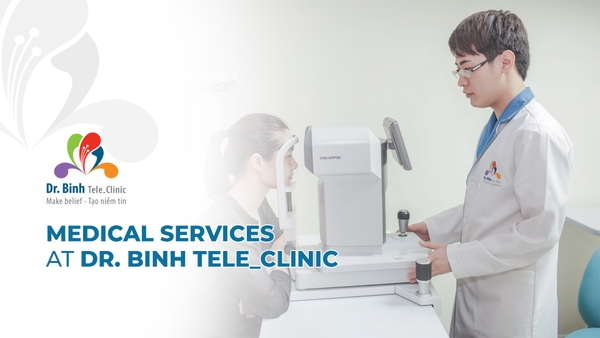The Importance Of Preventing Itchy STDs
- Dr.Binh Tele_Clinic offers up to 30% off on endoscopy with anesthesia combos
- Special Offers at Dr.Binh Tele_Clinic on Vietnamese Women’s Day
- Dangerous complications of cerebral infarction
- What to know when treating urinary stones?
28/06/2022
-0 Bình luận
As society develops, people's views on sex are also more open. Therefore, social and sexually transmitted diseases (STDs) are also increasing and more complicated. So how do STDs and the importance of STDs in today's society affect people's lives? Let's go with Dr. Binh Tele_Clinic learn in the article below.

1. STDs Concept?
STD stands for Sexually Transmitted Diseases.
The term sexually transmitted disease (STD) refers to a disease passed from one person to another through unsafe vaginal, anal, or oral sex.

An STD may also be called a sexually transmitted infection (STI) or a venereal disease (VD). However, you don't have sex to get an infection, and sharing needles or breastfeeding can also cause these infections.
2. Symptoms of Sexually Transmitted Diseases
When infected with an STD, some diseases will not develop symptoms that require specialized testing to detect. But some STDs will cause apparent symptoms.
For men
- Pain or discomfort during sex or urination;
- Sores, pimples, or rashes on or around the penis, testicles, anus, buttocks, thighs, or mouth;
- Abnormal discharge or bleeding from the penis;
- Painful or swollen testicles
Check out the men's health checkup package HERE
For women
- Pain or discomfort during sex or urination;
- Sores, pimples, or rashes on or around the vagina, anus, buttocks, thighs, or mouth;
- Unusual bleeding or bleeding from the vagina;
- Itching in or around the vagina
Check out the health checkup package for women HERE
3. How Many Types of Sexually Transmitted Diseases Are There?
There are many types of STDs. However, the most common are the following:
- Chlamydia: is a type of bacteria that causes pain/discomfort when having sex, green/yellow vaginal/penis discharge, and lower abdominal pain. If not treated promptly, it will lead to diseases such as Infection of the urethra, prostate or testicles; pelvic inflammatory disease; difficulty conceiving;... In women, the most common site of infection is the cervix.
- Gonorrhea: Gonorrhea and Chlamydia often occur together. Gonorrhea is also caused by bacteria that can be passed to a sexual partner during vaginal, anal, or oral sex.
- Genital herpes: A sexually transmitted infection (STI) caused by a Herpes simplex virus (HSV) virus. HSV infections can cause sores and blisters around the lips, genitals, or anus. Sometimes, HSV infection does not cause sores or goes undetected. Genital herpes is an incurable disease. However, several drugs can shorten the time it takes for lesions to recur and reduce or even prevent them from occurring.
- HIV: This is the human immunodeficiency virus, causing immunodeficiency syndrome when infected with HIV/AIDS. When HIV enters the body, it attacks the immune system.

When your immune system is weakened, your body cannot fight illnesses and infections like pneumonia, certain types of cancer, and other conditions.
Check out the pre-marital examination package information HERE
4. How to prevent STDs
There are many ways you can reduce your risk of STDs:
- Using a condom during vaginal, oral or anal sex will reduce the chance of infection. Do not use a condom more than once during sex.
- Avoid high-risk sexual behaviors such as lacerations, as it increases the risk of STDs. Anal sex is also risky because the tissues in the rectum are prone to tearing, and body fluids can also carry STIs.
- Vaccination helps prevent hepatitis B, warts and other viruses such as HPV, hepatitis B, hepatitis C ...
- Regular health check-ups to promptly detect hidden diseases that do not show symptoms to the outside.
Treatment of STDs is possible, but some diseases will cause people to live with them if they are unlucky. Therefore, regular health check-ups can be detected and treated promptly, helping reduce symptoms, reduce the risk of complications and protect sexual partners.
CS1: DR. BINH TELE_CLINIC
No. 11-13-15 Tran Xuan Soan, Pham Dinh Ho Ward, Hai Ba Trung District, Hanoi
Hotline: 19009204
Email: info@drbinh.com – Website: www.drbinh.com
Facebook: fb.com/biquyetchamsocsuckhoe
CS2: 365 MEDIHOME THANH LONG CLINIC
1st floor, Executive Building, Thang Long Industrial Park, Dong Anh, Hanoi
Hotline: 1900 9204
Website: thanglong.365medihome.com.vn/
Facebook: fb.com/365medihome




















Bình luận của bạn